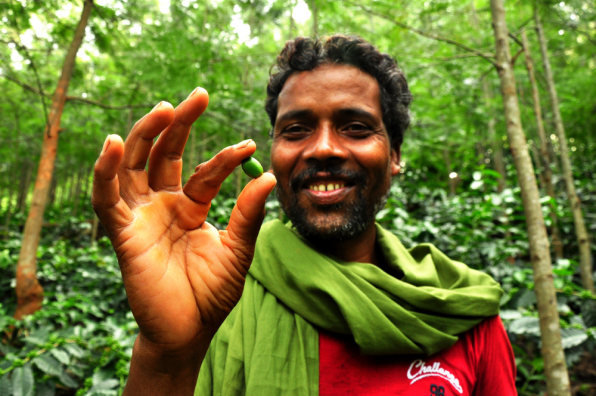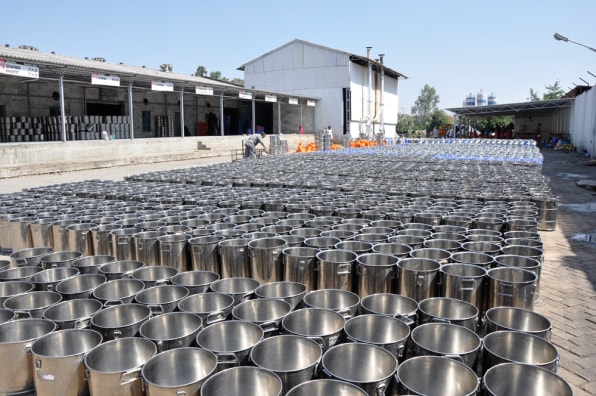Old Man Feeding Pigeons at the Park
It's hard to appreciate the scale of hunger in India because the scale is so vast. In some parts of the country (population: 1.2 billion), two out of every five kids are thought to be malnourished. Sub-Saharan Africa may have higher proportions of people who are hungry, but India still has the highest numbers of people who go without food.
Manoj Kumar has a theory about why that is. It's because hunger isn't a communicable disease: Unlike tuberculosis or AIDS, you can't catch it from someone else. So, there's less incentive for elites to deal with the problem, because they aren't at risk. That and another reason: The historic inefficiency of public services in India, and the limited capacity of its social sector. In the past, he says, nonprofits have tended to focus on activism rather than problem-solving.

"Thirty years ago in India, working for a NGO wasn't a fully evolved career option. The main role was to oppose government policy, and that meant there was typically one activist leader and a load of volunteers who opposed the policy," he says. "There was no revenue stream."
Since taking the helm of the Naandi Foundation in 2000, Kumar has tried to do things differently. For one, he's hired a lot of people from the for-profit sector, hoping that managerial know-how will prove more useful than mere passion and outrage. And, two, he's tried to rethink how to cater to large numbers of people cost-effectively. He seems to be pretty successful. Naandi now feeds 1.2 million kids a day through its school meals program (not to mention its clean water initiatives, which reach 3 million more).
"I always wondered why the age-old problems in India–open defecation, safe drinking water, hunger, and malnutrition–remained untouched. [I realized] that it wasn't because we needed to find fundamentally new policies. It was because we needed better service delivery," he says.

The Midday Meal program springs from a famous Supreme Court ruling that said every school kid has a right to food during school hours. Naandi started taking over inefficient state-run meal programs, moving from a model in which meals were cooked in small individual school kitchens (if at all) to a centralized system, where most meals are prepared in what Kumar calls Charlie And The Chocolate Factory kitchens. For example, Naandi built a two-acre facility in Hyderabad that feeds 120,000 kids a day across more than 1,000 schools. It's full of industrial food-processing machines (like a rice de-stoner that can handle four tons an hour) and huge vats for cooking curry and vegetables.
To pay for the kitchens and the trucking infrastructure that goes with them, Kumar turned to several major corporations. The government continues to pay for the food itself, but other costs are met through sponsorship. The companies get branding opportunities, while the states meet their legal obligations without further troubling taxpayers. It's a public-private partnership that benefits everyone, Kumar says.
The meals themselves are unlimited. The kids can eat as much as they like. Naandi supplements the traditional staples with boiled eggs, and fortifies the food with iron and vitamin A. Surveys showed that at least half of Indian children had anemia and/or were deficient in important micronutrients.
"Our challenge was to make the food tasty and exciting at the same time," Kumar says. "If you added a lot of spinach, for example, the kids didn't like it. But luckily I was serving a constituency that had yet to reach McDonald's. We didn't have much junk to wean them away from."
Naandi has since launched after-hours schooling programs, an initiative aimed at skilling unemployed youth, and an organic coffee business called Araku Originals that helps small-holding farmers in a remote, mountainous region.
Asked what he might do next, Kumar says he's keen to inspire other young entrepreneurs to take on social problems. "Rather than expanding in India, the real dream is to inspire more successful leaders across the world, youngsters especially, to try and replicate what we are doing," he says. "We need youngsters to ask questions about old social sector problems in their countries and try to crack them. Long-standing problems, like unemployment or primary health care, need very different people looking at them."
"I would urge people to think of ways you can involve successful business leaders in the social space," he adds. "Not just for the check they might write, but for their mind and the networks they can open for you. You need that approach to these problems, because these people are so results-oriented."
Source: https://www.fastcompany.com/3034777/the-man-who-feeds-12-million-kids-a-day
0 Response to "Old Man Feeding Pigeons at the Park"
Post a Comment